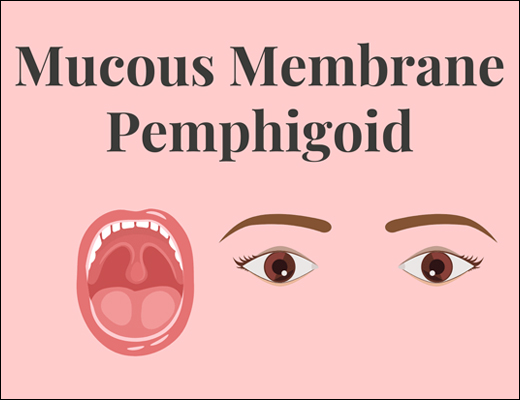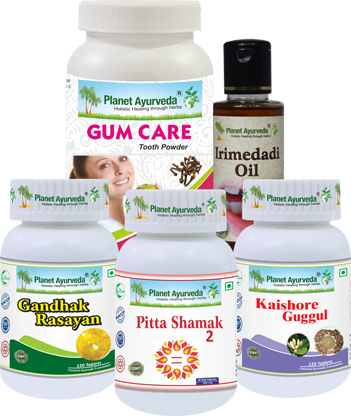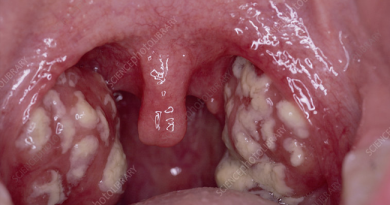What is Mucous Membrane Pemphigoid & It’s Ayurvedic Treatment with Herbal Remedies
Abstract
A healthy lifestyle includes eating well, regularly, getting enough sleep, and managing stress. Overall, it follows a healthy, balanced diet, which includes eating vegetables and fruits and avoiding processed food to avoid any disease in the body. But some diseases occur due to genetic, hereditary, and some are autoimmune diseases. In this article, we will talk about the autoimmune disease that is mucous membrane pemphigoid and its ayurvedic management.
Introduction
Mucous Membrane Pemphigoid is an autoimmune disease that affects the mucous membranes and causes blisters and erosions. It occurs mostly in people above 60 years of age, and affects women twice as much as men. It can affect the mouth, eyes, nose, and genitals. Mucous membrane pemphigoid can lead to scarring, which can cause blindness in severe cases.

Types of Mucous Membrane Pemphigoid
- Oral Mucous Membrane Pemphigoid:- The most common form of mucous membrane pemphigoid, it primarily affects the mucous membranes of the mouth, often leading to painful blisters and erosions.
- Ocular Mucous Membrane Pemphigoid:- This type primarily involves the eyes and can cause severe, progressive conjunctivitis, inflammation of the eye’s mucous membrane.
- Genital Mucous Membrane Pemphigoid:- This type affects the genital area, leading to painful erosions and blisters in the vulva, penis, or perineal regions.
- Nasal Mucous Membrane Pemphigoid:- This form involves the mucous membranes of the nose, leading to ulcerations, crusting, and possible scarring of the nasal passages.
- Esophageal Mucous Membrane Pemphigoid:- Mucous membrane pemphigoid can also affect the esophagus, leading to swallowing difficulties and esophageal scarring.
- Pharyngeal Mucous Membrane Pemphigoid:- Involvement of the throat (pharynx) is rare but can lead to significant discomfort and difficulty swallowing.
- Multi-Organ Mucous Membrane Pemphigoid:- In some cases, Mucous membrane pemphigoid can involve multiple mucous membranes simultaneously, affecting the mouth, eyes, nose, and genitals.
Causes
- Autoimmune response: The body’s immune system starts to produce antibodies that attack the body.
- Genetic Susceptibility: Some people may have a genetic predisposition to developing Mucous membrane pemphigoid.
- Environmental Factors: Environmental factors also play an important role in developing the mucous membrane pemphigoid.
- Drugs: Certain drugs like thiol, penicillamine, and atenolol can cause mucous membrane pemphigoid.
- Eye Surgery: Some cases affect or may trigger the mucous membrane pemphigoid, like cataract surgery.
Symptoms
- Swelling, redness, blistering, and inflammation in the mouth and gums
- Redness, soreness, and dryness of both eyes
- Blistering on the scalp, face, trunk, or limbs. The skin might have scars once the blisters heal
- Difficulty swallowing food or water
- As the blister heals, it scars in the affected area
- Blisters from open sores that burn or sting, especially when consuming spicy foods, citrus fruits, or hot beverages
Diagnosis
- Clinical Examination: Symptoms like lesions of blistering can be seen on the eyes, oral, or genital area.
- Direct Immunofluorescence: In this biopsy the affected area is examined under the microscope to check the deposition of autoantibodies.
- Serology Test: In some cases, a blood test can be done to check the antibodies in the body.
Treatment
Topical Treatment
- Steroid creams, gels, or rinses can be used
- Immunosuppressants can also be given
- Intravenous Immunoglobulins are also useful in the treatment of the Mucous membrane pemphigoid
Complications
- Ocular complications like scarring of the conjunctiva can lead to eyelid deformities like symblepharon and even blindness in the eyes.
- Oral complications, like in the mouth, can result in difficulty opening the mouth (trismus) or narrowing of the esophagus, making swallowing difficult.
- Genital complications In women, scarring can lead to vaginal stenosis, while in men, it can cause issues with urethral scarring.
Home Remedies for Mucous Membrane Pemphigoid
1. Aloe Vera Gel
- Apply fresh aloe vera gel directly to affected areas to soothe blisters and reduce inflammation.
2. Coconut Oil
- Coconut oil has natural antimicrobial and moisturizing properties that can help soothe and hydrate the affected mucous membranes
3. Vitamin E Oil
- Applying vitamin E oil may help in the healing of blisters and improve skin regeneration.
4. Cold Compress
- Apply cold compresses to painful sores for relief from burning or stinging sensations.
5. Saltwater Rinse
- Gargle with a saltwater solution to help cleanse the sores in the mouth or throat and prevent infection.
Herbal Remedies for Mucous Membrane Pemphigoid by Planet Ayurveda
Planet Ayurveda is a company that has GMP CERTIFIED, HACCP CERTIFIED, HALAL CERTIFIED, ISO CERTIFIED, and many more certifications. They make products not only for humans but for pets as well, under the supervision of MD Practitioners. They make products that are 100% natural and have no side effects. These products do not contain any kind of synthetic materials or preservatives. These products help in managing various health problems.
Product Description
1. Gum Care Powder
This powder contains natural herbs like Sonthi ( Zingiber officinale), Haritaki (Terminalia chebula), Mustak (Cyprus rotundus), Pong (Areca catechu), and many other herbs. Helps maintain our gums and teeth healthy. It helps in healing bleeding gums and ulcers, often associated with mucous membrane pemphigoid, as well as prevents secondary infections by keeping the mouth clean and reducing bacterial buildup.
Method of Application: This powder is gently massaged on teeth and gums with 3-6 grams.
2. Kaishore Guggul
This tablet contains many herbs like Amalki (Emblica officinalis), Bibhitaki (Terminalia bellirica), Haritaki (Terminalia chebula), Guggal (Commiphora mukul), Ginger (Zingiber officinale), Long Pepper (Piper longum), Black Pepper (Piper nigrum), and so on. It helps remove toxins (ama) that may aggravate autoimmune conditions and helps soothe chronic inflammation in the mucous membranes, like the Mucous membrane pemphigoid.
Dosage:- Take 1-2 Tablets twice daily with lukewarm water.
3. Irimedadi Oil
Irimedadi oil is a traditional Ayurvedic formulation, and ingredients can vary slightly depending on the specific recipe, but some common ingredients found in Irimedadi oil include Bala (Sida cordifolia), Haritaki (Terminalia chebula), Amla (Indian gooseberry), Manjistha (Rubia cordifolia), and Guduchi (Tinospora cordifolia). It helps in wound healing and tissue regeneration, soothes bleeding, swollen, or painful gums, and has antimicrobial properties to prevent secondary infections.
Method of Application:- Apply it on the gums for 2-3 minutes and then rinse it off with lukewarm water.
4. Gandhak Rasayan
These tablets contain many herbs like Guduchi (Tinospora cordifolia), Bhringraj (Eclipta alba), Giloy (Tinospora cordifolia), Shudh Gandhak (Purified Sulphur), Neem (Azadirachta indica), Bahera (Terminalia billerica), Amla (Emblica officinalis), and so on. It helps regulate the overactive immune response involved in autoimmune disorders like Mucous membrane pemphigoid supports faster healing of oral and mucosal lesions.
Dosage:- Take 1-2 tablets twice or thrice daily with lukewarm water.
5. Pitta Shamak
It is in the form of a capsule which contains many herbs like Sarpagandha (Rauwolfia serpentine), Ashwagandha (Withania somnifera), Mukta pisthi (Pearl), Guduchi satva (Tinospora cordifolia), etc. Pitta Shamak remedies help cool, soothe, and reduce inflammation, supporting the healing of mucous membranes.
Dosage:- Take 1-2 capsules daily, with plain water, twice a day after meals.
Conclusion
In this article, we read about the autoimmune disease, which is mucous membrane pemphigoid, which causes erosions and blisters, which can be due to genetic and environmental causes. It causes blisters on the skin, scalp, and other parts of the body. If not managed at the time, it may lead to various complications, which may include the eyes, nose, and genital areas. At Planet Ayurveda, certain medications can be given to manage the autoimmune disease. For more details, you can visit the site that is www.PlanetAyurveda.com







